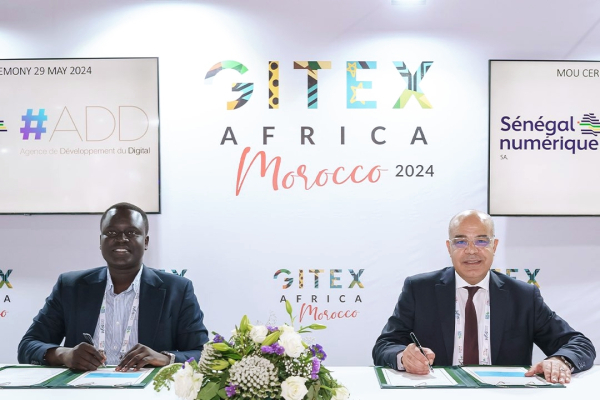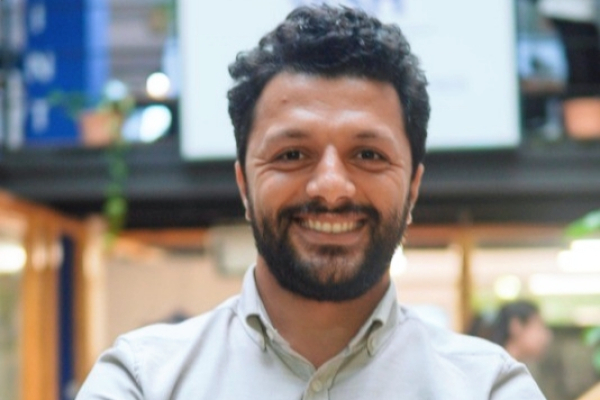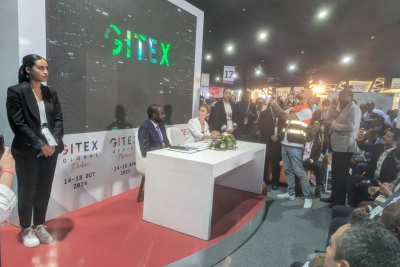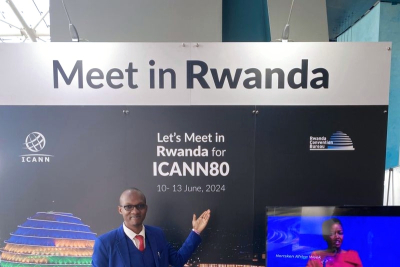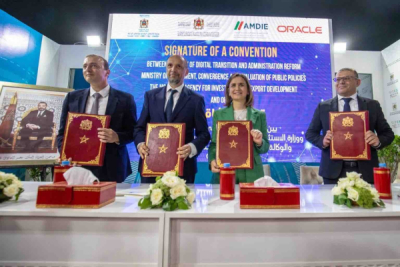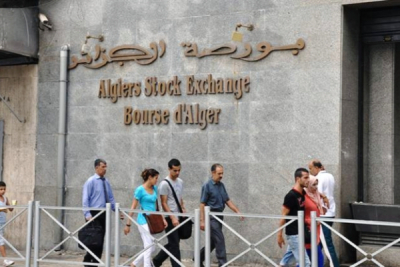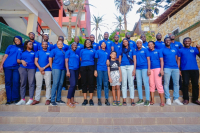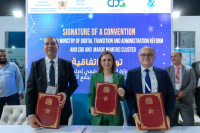To fulfill its mission, the Digital Development Agency (ADD) requires the collaboration of multiple stakeholders. The Moroccan public entity has recently signed several partnerships to this end.
The Digital Development Agency (ADD), Morocco's agency in charge of implementing the national digital strategy, signed a series of strategic partnerships during the second edition of Gitex Africa, a technology fair being held in Marrakech since May 29th.
The partnerships involve Sénégal Numérique SA, the National Observatory for Children's Rights (ONDE), the National Agency for Digital Development of the Comoros (ANADEN Km), Crédit Agricole du Maroc, Indra (a Spanish leader in technological solutions), the Moroccan Agency for Tourism Development (SMIT), and APEBI (the Federation of Information Technology, Telecommunications, and Offshoring).
The agreement with Sénégal Numérique SA prioritizes knowledge and experience sharing as well as system interoperability. This collaboration aims to improve the efficiency of public and private services and promote digital inclusion alongside the development of digital platforms and applications.
The partnership with ONDE aligns with ADD's "Digital Culture / Online Child Protection" action plan and focuses on fostering a safe and child-friendly digital environment.
ADD and Indra, the Spanish technology leader, will collaborate to develop innovative solutions specifically tailored to Morocco's needs. This partnership aims to enhance the country's digital competitiveness.
The agreement with Crédit Agricole du Maroc focuses on experience sharing, training programs, and skill exchange in the digital domain. This collaboration aligns with ADD's ongoing efforts to promote digital careers, raise digital awareness, and support the entrepreneurial ecosystem.
Meanwhile, the partnership with ANADEN Km, the Comoros' digital development agency, covers the sharing of experience, best practices and digital transformation strategies. It notably aims to improve human resource capacities through training and awareness programs focused on the appropriate use of digital tools.
A tripartite agreement between ADD, SMIT, and APEBI was also signed to spearhead the digitization of Morocco's tourism sector.
These collaborations build upon the agreement signed with Visa, a global leader in digital payments, on May 17th. This earlier partnership supports the government's initiatives in financial inclusion and digital development.
A serial entrepreneur, he harnesses the power of technology to create solutions for businesses, helping them boost their efficiency and reach.
Bilal Nsib (photo) is a Tunisian tech entrepreneur and the co-founder and CEO of Screenflex. He leverages technology to help businesses broadcast advertisements, information, or entertainment.
Founded in 2021, Screenflex is a cloud-based platform that enables businesses to create, manage, and display engaging and personalized content on their digital screens. The company's goal is to simplify and optimize digital signage management and marketing for businesses. It offers a suite of features and tools allowing businesses to create high-quality content for their screens. These tools include customizable templates, drag-and-drop design tools, and support for various media formats.
Beyond management functions, Screenflex provides advanced marketing capabilities based on artificial intelligence, enabling businesses to create interactive experiences for their customers. Users can also schedule playlists of content to be displayed on their screens.
A serial entrepreneur, Bilal Nsib co-founded BeeCall in 2018, a Tunisian contact center that helps businesses grow. In 2020, he co-founded Arty.land, a platform that provides artists with a space to connect, unlock opportunities, and monetize their passion. He served as CEO until 2021.
The entrepreneur graduated from the Higher Institute of Computer Science in Tunisia, earning a bachelor's degree in industrial computing, specializing in embedded systems, in 2010, and an engineering degree in applied sciences and technology in 2014. The following year, he became CEO of InnovAnt, a Tunisian company specializing in strategy development, design, and technology development.
Melchior Koba
The Nigerian Information Technology Development Agency, NITDA, signed on May 30, a Memorandum of Understanding (MOU) with KAOUN International, organizers of GITEX, to bring GITEX Africa to Nigeria in 2025.
The agreement was signed during the ongoing GITEX Africa by Kashifu Inuwa, Director General of NITDA, and Trixie LohMirmand, CEO of KAOUN International in Marrakech, Morocco.
Hosting GITEX Africa in Nigeria, the continent's most populous nation with a vibrant tech scene offers a significant opportunity to showcase the country's industries and startups to the world.
Rwanda will host the 80th public meeting of the Internet Corporation for Assigned Names and Numbers (ICANN) next month, marking the first time this event is held in East Africa. The Kigali Convention Centre will host the event from June 10 to 13, organized with Rwanda's Ministry of ICT and Innovation.
ICANN aims to promote a stable, secure, and unified global internet. This event underscores ICANN's commitment to international participation in Internet governance and highlights Rwanda’s growing influence in the ICT sector.
Morocco aims to position itself as a leading technology hub in the field of digital technologies in Africa. The country benefits from the support of foreign partners to achieve this goal.
American tech giant Oracle announced on Thursday, May 30, 2024, plans to open two public cloud regions in Morocco to provide cloud services to local and regional businesses across Africa.
“The upcoming new regions will enable Oracle customers and partners to migrate mission-critical workloads from their data centers to Oracle Cloud Infrastructure (OCI), while helping them comply with local regulations. As a result, customers and partners can access a wide range of cloud services to modernize their applications and innovate with AI, data, and analytics,” the group stated. The planned public cloud regions in Casablanca and Settat underscore Oracle’s commitment to Africa and will help drive the digital transformation of businesses, startups, universities, and investors in Morocco and throughout the region.
The memorandum of understanding establishing these two cloud regions was signed on May 29 between Oracle executives and Moroccan Investment Minister Mohcine Jazouli on the sidelines of GITEX Africa 2024.
“As one of the largest economies in Africa, and with strong business and cultural connections with West Africa, Maghreb, and Europe, Morocco offers unique growth opportunities for businesses that are aiming to accelerate their expansion by deploying the latest digital technologies,” said Richard Smith, Oracle’s Executive Vice President for Europe, Middle East & Africa, as quoted in the statement.
“The opening of Oracle’s public cloud in Morocco will accelerate the digital transformation throughout the region. This strategic expansion, with a hyperscaler like Oracle, positions Morocco as a unique player in the region and allows an even more dynamic development of skills, and growth opportunities,” said Ghita Mezzour, Morocco’s Minister Delegate to the Head of Government in charge of Digital Transition and Administrative Reform.
The digital transformation of African economies is gaining momentum, with Algeria digitizing its financial sector.
La Commission d'organisation et de surveillance des opérations de bourse (Cosob) d'Algérie, en collaboration avAlgeria plans to electronic stock exchange order submission on June 2nd, a release dated May 29th announces.
The initiative launched in collaboration between the Securities and Investments Organization and Monitoring Commission (COSOB) and the Government Authority for Electronic Certification aims to streamline stock market transactions by allowing investors to electronically submit buy and sell orders through authorized intermediaries.
For COSOB, the digitization plan aligns with "the dynamic growth of the financial and stock market in Algeria, fulfilling the commitment of President Abdelmadjid Tebboune to develop financial and stock markets to finance the economy,” informs the statement quoted by Algérie Presse Service.
This initiative comes on the heels of new mechanisms approved by COSOB last November to revitalize trading practices and stimulate activity on the Algiers Stock Exchange.
Algeria, like many African nations, is embracing digital transformation. In September 2023, the authorities established the High Commission for Digitalization, tasked with implementing the National Digital Transformation Strategy (2024-2029) and achieving a comprehensive digitalization of Algeria by 2034.
Adoni Conrad Quenum
A mechanical engineer by training, he chose to embark on an entrepreneurial journey after graduation. He develops technological solutions that make life easier for Angolans.
Erickson Mvezi is a co-founder and CEO of Tupuca, an Angolan startup transforming the way people order and receive meals and other essentials. Born in Angola, Mvezi founded Tupuca along with Patrice Espírito Santo, Sydney Texeira, and Wilson Ganga to provide users with a convenient platform to order meals and have them delivered to their homes.
Established in 2015, Tupuca initially focused on home meal deliveries. However, the company quickly expanded its services to include grocery orders, support for small businesses, and even postal services. Tupuca's delivery personnel can run errands at various stores in Luanda on behalf of their clients, making it a one-stop-shop for many users.
In 2022, Tupuca expanded its operations to the Democratic Republic of Congo and is currently developing a super mobile application. According to Mvezi, the company is strategically positioning itself for rapid growth over the next 18 months through the implementation of an all-in-one super-app strategy.
Mvezi holds a bachelor's degree in mechanical engineering from the University of Louisiana at Lafayette, which he earned in 2014. He also holds a master's degree in social entrepreneurship from Hult International Business School in the United States, obtained in 2015. Besides Tupuca, Mvezi co-founded the T’LEVA app in 2018, which allows users to order a taxi based on their location.
Mvezi began his professional career in 2009 as a mechanical engineering intern at C&C Technologies South Africa. In 2015, he worked as a business development consultant for IDEO.org, a nonprofit design studio that creates programs, products, and services to improve health, economic mobility, and well-being.
Melchior Koba
Dakar-based LAfricaMobile, a multi-channel, multi-operator, and multi-country digital cloud platform, said on Wednesday it closed a successful Series A funding round of €4.3 million. The investment, announced at GITEX Africa in Marrakech, Morocco, will be used to bolster its technology with artificial intelligence integration and fuel expansion across Francophone Africa.
During the inaugural edition of the GITEX Africa technology fair, Moroccan authorities launched the pilot phase of a digital skills training project for young people. One year later, they are committed to expanding it nationwide.
During the second edition of GITEX Africa (May 29-June 31) in Marrakech, Morocco, the Moroccan Ministry of Digital Transition and Administrative Reform signed an agreement on Wednesday, May 29, with the country’s Deposit and Consignment Fund, CDG, and Maroc Numeric Cluster to expand the JobInTech program nationwide. The goal is to equip 15,000 young people with digital skills by 2026.
JobInTech offers training programs lasting from 3 to 6 months. These are free of charge, as they are fully funded by the Ministry of Digital Transition and Administrative Reform in partnership with CDG. The aim is to develop a talent pool, support the national digital ecosystem, and provide young people with opportunities to enhance their employability through reskilling and upskilling training.
The national expansion of the project follows the success of its pilot phase, during which over a thousand young people were trained along the Casablanca-Rabat axis, achieving a professional integration rate of around 73%. This implementation is part of the Morocco Digital 2030 strategy, which aims to make the kingdom a regional leader in digital education. To this end, Moroccan authorities have formed multiple partnerships with entities such as the Chinese tech firm Huawei, American companies Oracle and Cisco Systems, and the United Nations Educational, Scientific and Cultural Organization (UNESCO).
The pilot phase of JobInTech was launched during the first edition of GITEX Africa on June 2, 2023. The JobInTech training programs cover various technology segments, including software development, data analysis, and artificial intelligence.
Adoni Conrad Quenum
Investments in digital sectors are vital for Africa's development, providing a blueprint for integrating digital and sustainable solutions to stimulate economic growth. Enhanced connectivity and e-mobility initiatives will create jobs, lower transaction costs, and improve access to services and markets, promoting sustainable development across the continent.
Kenya's digital and sustainable mobility sectors received a $250 million investment from the US International Development Finance Corporation (DFC) during President William Ruto's state visit to Washington, DFC announced on May 23.
“With this week’s announcements, DFC is doubling down on its commitments to Kenya’s development, with investments into energy, e-mobility, and infrastructure,” said DFC CEO Scott Nathan.
The financing, a mix of loans and grants, targets key Kenyan companies including M-KOPA, BasiGo, Mogo Auto, Roam Electric, and Pezesha Africa Limited.
M-KOPA secured $51 million to enhance digital connectivity and provide affordable smartphones, with plans to expand its production facility. Mogo Auto Kenya and BasiGo received $10 million each to support used vehicle loans and electric bus manufacturing. Roam Electric also received $10 million for electric vehicle development and charging infrastructure, while Pezesha was granted $500,000 to improve SME credit scoring algorithms using advanced technologies.
This move aligns with Kenya’s Digital Economy Blueprint, which aims for universal digital access and participation. The USAID Digital Ecosystem Country Assessment (DECA) 2020 highlights Kenya’s robust ICT infrastructure, with 95% of the population covered by 2G, 88% by 3G, and 61% by 4G, and plans for 5G rollout.
President Ruto’s visit to Washington emphasized strengthened US-Kenya relations and investments in digital and renewable energy. With support from the US government, DFC, and tech giants, Kenya is set for significant advancements in digital and sustainable energy sectors, driving technological growth, economic development, and job creation.
Hikmatu Bilali
More...
Less than 2% of global data centers are located in Africa. However, since the Covid-19 pandemic, cloud computing has garnered increasing interest, becoming a valuable alternative for businesses looking to digitize.
Orange Middle East & Africa (OMEA) and Amazon Web Services, Inc. (AWS) announced on Wednesday, May 29, the signing of a partnership on the sidelines of the GITEX Africa technology fair in Morocco. The initiative aims to introduce AWS Wavelength in Morocco and Senegal by the end of the year. This solution will enable startups, businesses, and public agencies to process and store their data locally.
“The announcement of AWS Wavelength Zones for North & West Africa is a major achievement in our strategy to foster the cloud transformation of African businesses. We will help Moroccan and Senegalese organizations of all sizes benefit from AWS, while ensuring local data hosting in Orange’s secure data centers, along with our best connectivity solutions,” said Jérôme Hénique, CEO of Orange Middle East and Africa.
In addition to establishing the first AWS Wavelength zones in Africa, this initiative also marks the introduction of the first Wavelength zones in countries without existing AWS regions or local zones. As part of the partnership, Orange will handle the hosting of services in its data centers, ensuring optimal security and reliability for users.
This partnership comes at a time when the demand for IT services in Africa continues to grow, attracting cloud computing operators. According to a report published in February by the audit and consulting firm PricewaterhouseCoopers (PwC), more than 80% of African businesses that have already partially or fully migrated to the cloud plan to increase their investments in this technology due to its positive impacts on their operations.
The introduction of AWS Wavelength is expected to allow customers to benefit from the cloud's on-demand, pay-as-you-go pricing model. This will enable them to keep their data localized while enjoying the same reliable, secure, and high-performance infrastructure as AWS regions.
Samira Njoya
She has worked as a communications manager in various organizations. She leverages her expertise to inspire and empower women in the digital field while fostering a supportive and collaborative community.
Josceline Yvonne Andriamiarintsoa, a Malagasy digital communication specialist and entrepreneur, is the founder and CEO of Ladies’Gital, a company committed to advancing women’s empowerment in the digital realm.
Established in 2021, Ladies’Gital is devoted to nurturing digital entrepreneurship among women. The company organizes programs and workshops aimed at enhancing women’s digital skills. It also facilitates connections between these women and international partners seeking support for their digital strategies.
Ladies’Gital has created a community where women engaged in the digital sector, as well as those aspiring to join, can exchange insights and interact. The company’s service offerings include community management, virtual assistance, and copywriting.
Andriamiarintsoa is an alumnus of the University Institute of Madagascar, where she earned a master’s degree in Business Management and Administration in 2016. She also holds a master’s degree in Media, Society, and Development, with a focus on Organizational Communication, which she obtained from the University of Bucharest in 2022.
Her professional career in digital communication began in 2015 at Mada Creative Agency, where she worked as an SEO content writer. She subsequently freelanced for TactikMedia for two years as a content creator and translator. In 2016, she assumed the role of Communications Manager and Community Manager at the Alliance Française of Antananarivo.
In 2019, she joined the International Organization of La Francophonie (OIF) as a Communications Officer. From 2021 to 2023, she held the position of Regional Communications Manager for the Agence Universitaire de la Francophonie in Central and Eastern Europe.
Melchior Koba
Positioned as one of the pioneers in the Rwandan ecommerce sector, the platform targets moms, busy people, singles, new residents, and the Diaspora.
Murakali is an e-commerce solution developed by a young Rwandan startup, enabling users to make purchases through its web and mobile platforms. Based in Kigali, the startup was founded in 2015 by Yvette Uwimpaye.
Its mobile app is available on iOS and Android, with over a thousand downloads. Users can create an account with their personal information and access the startup's services. They can purchase a variety of products online, such as household items, groceries, general food products, baby items, and more.
Uwimpaye describes Murakali's target audience as "moms, busy people, singles, new residents, the Diaspora that want to shop for their families living in Rwanda, and for organizations that need to shop for office consumables and office stationery."
The startup’s competitive edge lies in its ability to aggregate offerings from various retailers alongside its own inventory. This approach fosters a diverse product selection, giving customers access to a wider range of specialized shops within the Murakali marketplace.
It also provides a delivery service and has partnered with the American company DHL for international deliveries. While awaiting expansion to other African countries, Murakali already has customers outside Rwanda, including in Uganda, Kenya, and even beyond the continent in the United States and Switzerland.
Adoni Conrad Quenum
A digital transformation specialist, he contributes to the evolution of the agro-industry with technological solutions that boost efficiency, ensure food safety, and promote economic growth.
Bertrand Foffe (photo) is one of the co-founders and the CEO of Jangolo, a startup revolutionizing the agricultural landscape through the power of digital technologies. A Cameroonian-born, he founded the company with Rodrigue Kwanga and Paulin Nguekam.
Established in 2016, Jangolo serves as a bridge between farmers, agro-industries, restaurants, and consumers, fostering a transparent and efficient agricultural value chain. The company aims to reduce post-harvest losses and facilitate access to information for farmers and agribusinesses. It also seeks to ease market access for local producers by digitizing agro-food value chains.
"Our goal is to transform the African agro-industrial landscape, making it more productive, sustainable, and technologically advanced. Jangolo envisions a future where every stakeholder has access to the tools for success," reads the startup's LinkedIn page.
Bertrand Foffe graduated from Fontys University of Applied Sciences with a bachelor's degree in Information and Communication Technology in 2012. He began his professional career in 2013 at GasTerra, a natural gas and green gas wholesaler, as a software engineer.
He later held software engineering positions at several energy companies such as Powerhouse and Essent. He also worked as a solutions engineer at Philips, Rabobank, and Accenture, a company that helps large enterprises, governments, and other organizations build their digital infrastructure, optimize operations, accelerate growth, and improve citizen services.
Melchior Koba


